|
|
|
Sort Order |
|
|
|
Items / Page
|
|
|
|
|
|
|
| Srl | Item |
| 1 |
ID:
136828
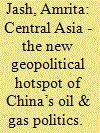

|
|
|
|
|
| Summary/Abstract |
Since the end of the Cold War and the decline of USSR, Central Asia, rich in oil and gas reserves has become the focus of national interest for global powers.The quest for energy has shifted the balance of power to the Central Asian Republics, making it an energy region of global importance. Of which, China’s increasing footprints in Central Asia, particularly in the energy sector, has drawn wide attention. Whereby, the region has risen from being a marginal factor to that of becoming a top priority in China’s foreign policy. It is guided by China’s vital interests to meet its expanding energy needs which face a supply crisis. In this dynamic, Central Asia has become a geopolitical opportunity for China to fulfil its political and economic objectives in the international arena.
|
|
|
|
|
|
|
|
|
|
|
|
|
|
|
|
| 2 |
ID:
135469
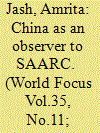

|
|
|
|
|
| Summary/Abstract |
South Asia has become the new theatre of geopolitics in the international system. In this phase of multilateral diplomacy, global powers seem to look the ‘regional way’ than acting as isolated actors. Here, the South Asian Association of Regional Cooperation (SAARC) - a regional framework in South Asia has gained prominence in the sphere multilateralism. What is surprising to note, is that, though SAARC has not been able to succeed in becoming an ideal regional cooperative model but there seems to be a rising international interest to engage in SAARC by means of attaining observer status to that of an aspiration for a full membership.
|
|
|
|
|
|
|
|
|
|
|
|
|
|
|
|
| 3 |
ID:
157808
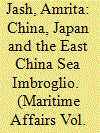

|
|
|
|
|
| Summary/Abstract |
The East China Sea dispute has become a characteristic feature in the defined “hot economics, cold politics” relations between China and Japan. The maritime sphere has gained precedence in the larger realm of diplomacy, thus making the contested waters a primary hotspot of power politics between the two Asian countries. With the growing tensions, in all likelihood the maritime dispute will be high on the political and security agenda of China and Japan. What makes this worrisome is that the dispute does not just make the bilateral relations unstable but holds significant implications for East Asia’s regional stability. In this regard, given the phenomenon of constant testing of each other’s resolve, the possibility of an all-out confrontation in the East China Sea remains a vital concern. What has further added to the power struggle is the US involvement, thus making the dispute a difficult case to resolve. The crux of the paper lies in understanding the volatility of the East China Sea dispute between China and Japan. In doing so, the paper examines the determinants of the dispute, the actors involved and their responses.
|
|
|
|
|
|
|
|
|
|
|
|
|
|
|
|
| 4 |
ID:
148754
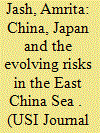

|
|
|
| 5 |
ID:
142727
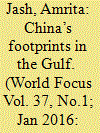

|
|
|
|
|
| Summary/Abstract |
With the turn of the twenty-first century, the most characteristic feature that dominates international politics and economics is the ‘rise of China’. With its booming economy, the biggest challenge faced by China is securing its increasing energy needs that are crucial to sustain the economic growth and stability. That is, energy security is directly related to economic security. In traditional understanding, economic security is concerned with ‘the degree to which national security is threatened by dependence on external sources of technology, raw materials, food and fuel’. And in this perspective, energy security is about the demand and supply of energy resources. In a broader understanding, Belgrave ET. Al. define energy security as:
|
|
|
|
|
|
|
|
|
|
|
|
|
|
|
|
| 6 |
ID:
176003
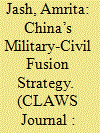

|
|
|
|
|
| Summary/Abstract |
Since Xi Jinping came to power, new concepts and ideas have come to define China’s polity. Of which, Military-Civil Fusion (MCF) is one of the significant concepts added to China’s national strategy with the aim to integrate the civilian research and commercial sectors with the military and defence industrial base. The MCF is integral to Xi’s vision of China Dream of building a strong country with a strong military by enabling the Military to harness the country’s rapid economic growth. Here, the quest lies in building capabilities in ‘dual-use’ technology and infrastructure to enhance China’s overall economic and military capability and secure China’s position vis-à-vis the West. The challenge for China is to match the speed and scope of the rapid technological pace to create fast or lose the ability to compete.
|
|
|
|
|
|
|
|
|
|
|
|
|
|
|
|
| 7 |
ID:
173707
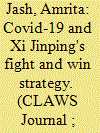

|
|
|
| 8 |
ID:
140629
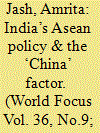

|
|
|
|
|
| Summary/Abstract |
India’s relations with Southeast Asia is one of the promising relations in Asia and that of the 21st century. The relationship is endowed with strong civilizational and cultural links of the past to that of its strategic links in the present-being global economic players, Asian regional giants and most importantly, partners with varied commonality of interests ranging from trade to that of security- both traditional and non-traditional concerns. The end of the Cold War brought about structural changes in the international system that led India to adopt new orientations in its foreign policy. Under this shift, India adopted ‘Look East’ policy in 1992 which resulted into a strategic shift in India’s perspective- bringing Southeast Asia closer to its foreign policy orbit. But with the changes in the global politics as a result of ‘China’s rise’, this relationship too is having a causal effect on its geo-political and security landscape. This ‘China factor’ has thereby elevated the paradigm of India-ASEAN relations to that of a ‘Strategic Partnership’ from being ‘Dialogue Partners’.
It is in this context that the paper examines India’s relations with ASEAN under the strategic interests and concerns. It explores the pertinent aspects that influence the India-ASEAN relations and thereby, argues that India’s policy towards ASEAN has witnessed a shift from just ‘looking towards east’ to that of ‘engaging with the east’.
|
|
|
|
|
|
|
|
|
|
|
|
|
|
|
|
| 9 |
ID:
133912
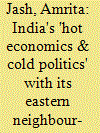

|
|
|
|
|
| Publication |
2014.
|
| Summary/Abstract |
India and China have made a significant stride in their bilateral relations which is exemplified in their 60 years of the 'Panchsheel Agreement of 1954'. Though India's relations with China has often been weighed down by the protracted boundary problem but the growing economic engagement has given a new high to the relationship. The growing economic interests between the two rapidly growing Asian giants significantly suggest that commerce can even flourish in the presence of very hostile relations. This unique characteristic of India's relations with China based on their convergent economic interests and divergent political interests posit a unique case study of both cooperation and conflict running parallel to each other.
|
|
|
|
|
|
|
|
|
|
|
|
|
|
|
|
| 10 |
ID:
182062
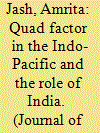

|
|
|
|
|
| Summary/Abstract |
While the world has come to a grinding halt under the Covid-19 pandemic, the Quadrilateral Security Dialogue, commonly called the
Quad, took traction under this very crisis. While countering China
ranks high on the Quad’s agenda, the unfolding security environment makes it
appear to have become the key agenda. That is to argue, although the Quad has
not outright stated this fact, China, undeniably, is the elephant in the room. The
fact that Beijing is excluded from the four-member grouping itself quantifies the
very logic behind the making of the Quad. In this case, the Quad can be seen as
a new kind of twenty-first-century security alliance
|
|
|
|
|
|
|
|
|
|
|
|
|
|
|
|
| 11 |
ID:
163408
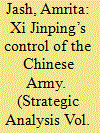

|
|
|
| 12 |
ID:
129655
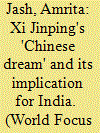

|
|
|
|
|
| Publication |
2014.
|
| Summary/Abstract |
The people's republic of China (PRC) welcomed its fifth generation of leadership with the conclusion of the 18th Party congress in the November 2012. With this change in the political leadership, Xi Jinping succeeded Hu Jintao as communist party of China (CPC) general secretary and chairperson of the Central Military Commission and in March 2013, the National People's Congress (NCP) elected him as the President of PRC. In Chinese politics, leaders have often promoted distinct governing philosophies in order to achieve the goals of wealth and strength that have defined their leadership style.
|
|
|
|
|
|
|
|
|
|
|
|
|
|
|
|
|
|
|
|
|